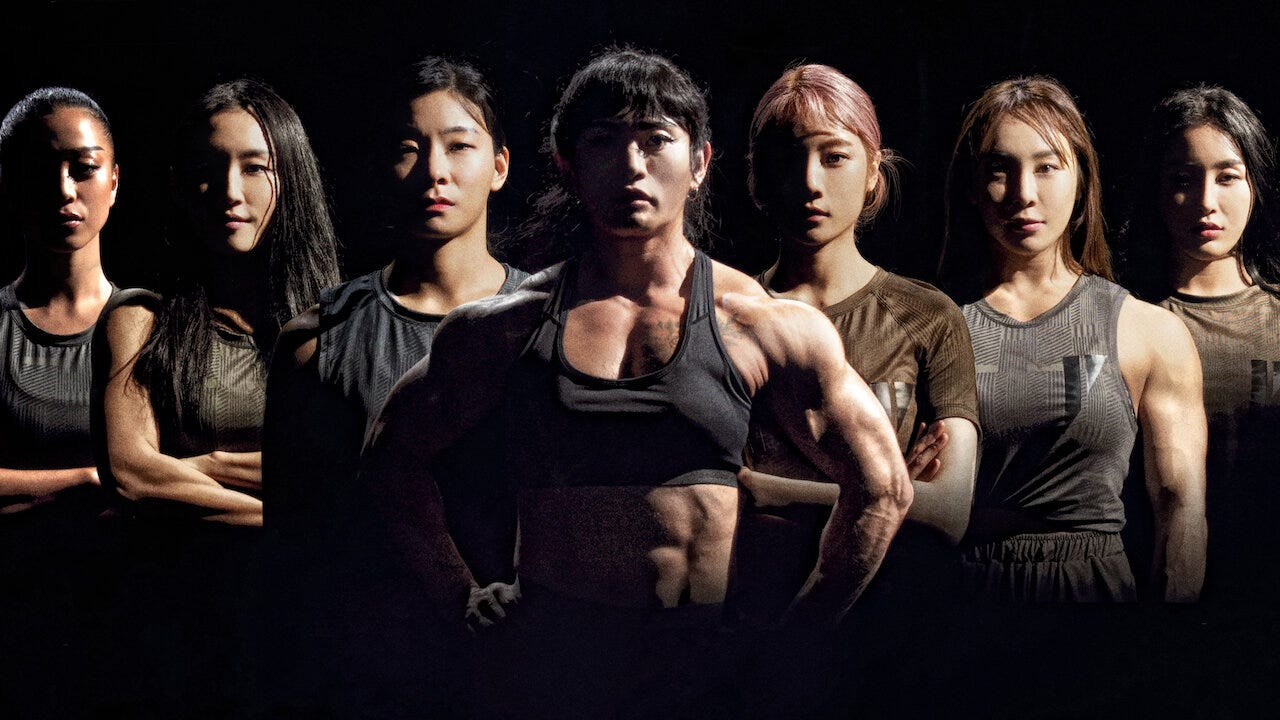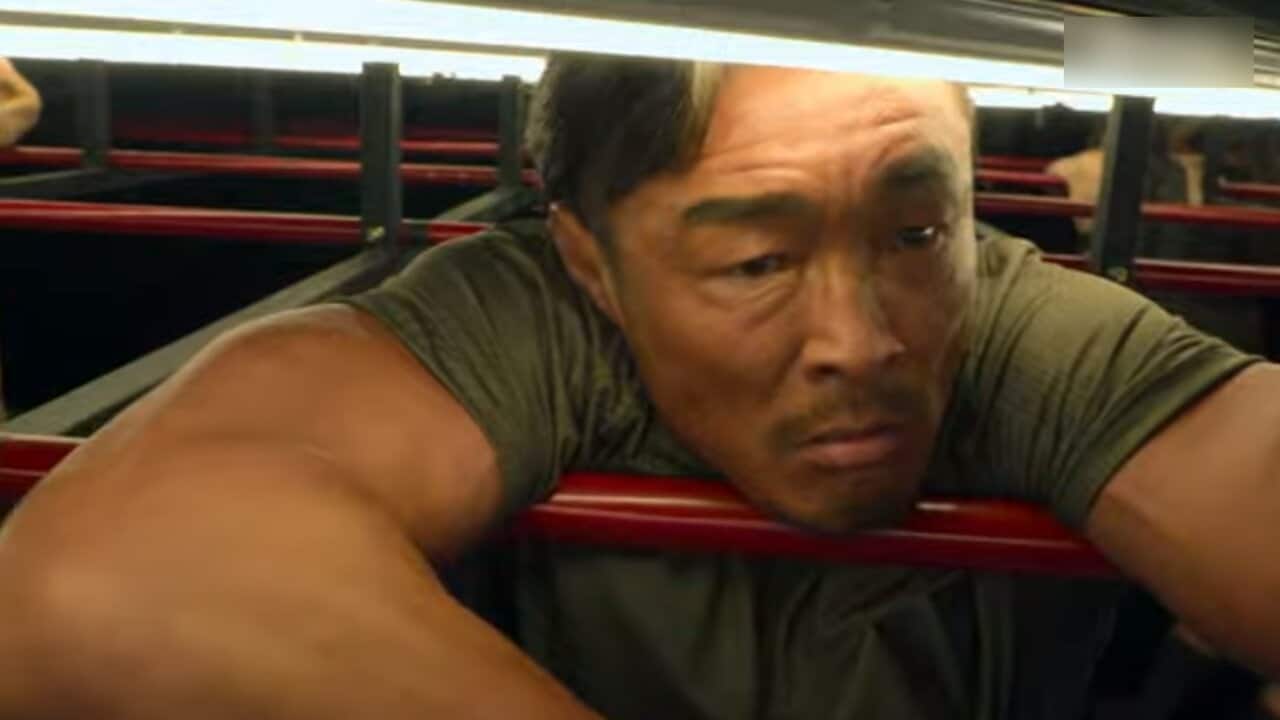I am horny with respect for the big muscle babies of Physical: 100
I thought I wanted these buff koreans to snap my spine, but turns out I want them to snap me out of it (it being my flop era)
I’ve been thinking a lot about respect and confidence and jealousy lately, which I think is a common thing to navigate when you’re a working artist in a place as small as Australia. Weirdly, I had an epiphany about my own practice after watching some swole South Koreans wrestle in a small muddy hole.
Towards the end of last year I had a couple of shortlist moments - my last book, my journalism, and a financial opportunity all finalists for winning a prize, so extremely close so that you can taste it, but ultimately unsuccessful. Alas. So it goes. It’s fine.
It’s not a new feeling, I’ve haunted the shortlists for my entire career, and I’m secure enough in my own talents and the validity of my work and the realities of publishing in Australia to simply take the implied compliment and get on with it. I’m doing fine and great and awards and manifestations of praise are just garnish, not the meal. But also, good god i’m starving for a cocktail onion, because I love my fripperies and my frills, and I deserve to be celebrated and feted like an inbred emperor!
I decided a long time ago that the only person I was in competition with as an artist, in my career, was myself. I decided that I would focus on myself and ignore what other people - my peers, my friends, my enemies - were achieving, so that I wouldn’t fall into the trap of comparison, of jealousy.
It’s small, here in Australia. People look at what you have, and where you are, and they want it, not realising that there’s only a tiny amount of opportunities at any time, and that roads to success are twisted and shadowy paths through the woods that often just go nowhere. The ledges up the mountain are so small, and get smaller all the way up. I’ve seen people complaining about my successes, while I’ve looked around at the vast expanse of debt I’m in and thought “this is nothing”. I’m probably doing the same looking at someone above me, who just got an opportunity, or a prize that I wanted.
Part of this difficulty comes from the fact that you’re shooting yourself in the foot if you don’t present yourself as being successful and joyous and “thrilled and excited” at all times. Social media and increased engagement with artists means that we have to be careful about controlling our personal narrative. If you present yourself as being talented and famous and a winner, then people will follow that narrative. I used to tell authors whose work I was marketing to never complain about bad reviews, never talk about sales, and never badmouth their competitors - because once you create that story for yourself, that becomes your reality.
I’ve always used a paraphrased Kurt Vonnegut quote to think about the state of being an artist in Australia: “we’re all in the same sinking ship, rowing furiously”.
There’s a kind of nihilistic comfort in that - when you realise “success” is almost an impossible utopia, it means you get to define what success looks like to you.
The fact that this sinking ship sounds exactly like a Physical: 100 challenge is why I started thinking about the parallels between this weird reality game spectacular, and the Hunger Games style reality of trying to be an artist.

I want to be huge and happy about how huge i am
I cannot stress just how enjoyable a watch the new South Korean Netflix reality challenge show Physical: 100 is. Like the contestants, it’s just swollen with thick and beefy delight.
When I went to watch this show, it was because it was trending around the world AND wears its Squid Game comparisons on its flexed sleeve, meaning it was almost like culture writer homework. I thought it might be suitable for our recaps, because I assume we’d get a whole bunch of roided up muscle-idiots doing all sorts of het nonsense. I thought if I found any enjoyment from the show, it would be mean and spiteful.
I was so wrong. Turns out I wasn’t using the biggest muscle of them all (my brain), and was speaking out of my actual biggest muscle (my ass).
I thought this show would be toxic masculinity written large, meaningless feats of great strength, and with about 100 bodybuilder types packed into a room, I was sure it would smell INSANE in there. I thought that I would hate these people.
But what struck me was the respect for each other that went hand-in-hand with the pride. The word wholesome has been overused, but the show differs from Squid Game in such a dramatic way, because it’s about a bunch of people who are just thrilled about being in the same room as people in their field who they admire and respect. It made me think critically about being an artist, and self-doubt, and community.
It also made me think about what it would be like to have a thigh the same width of my entire body.

I didn’t realise that you could be a nerd about being a jock
The premise of Physical: 100 is that a hundred of South Korea’s fittest people, from all sorts of disciplines and walks of life and jobs, are forced to compete in a Gladiator style series of games, in order to prove who has the ideal body, if such a thing exists.
The tasks are often elaborate, and can range from hanging off some glorified monkey bars for as long as possible, ferrying sand across a rickety bridge with a team, or straight up fighting over a ball.
In the first episode, the contestants come into a huge room filled with plaster casts of their body. They are often proud of their own bodies, as they should be: they’re all insanely rippped and often beautiful. But what struck me was the professional respect and joy they had for everyone else’s physiques too.
“Wow! He’s a monster” they’d say, upon seeing a bust or even the real person. This continued - they all seemed to be able to navigate professional respect and admiration with their own confidence and respect for their own bodies.
But it moved beyond that. Quickly we saw that this respect dictated how they competed against each other. We saw younger people bow to older legends, or the achievements and successes of famous contestants spoken about with pride. It quickly became clear that the contestants felt pride at being in the room with these people, that there was glory in being able to compete with people they respect.
So much of this is clearly wrapped up in Korean culture, especially when it comes to elders - if this was made in Australia or America, it would be so different and probably bad. But I would hazard an uneducated guess to say that much of it also comes from the type of muscle nerds that this show attracts.
I asked Dr Sung-Ae Lee from Macquarie University, who is an expert in Korean literature, film and television about what role respect plays in Physical: 100, so I could stop taking wild guesses.
“Confucianism plays an important role in Korean society. For example, Korean still maintains a complex system of honorifics in address, e.g. formal addresses vs informal addresses and so on. This also extends to patterns of address when people are older than you or senior in some way. All of these things are still around and are used in Physical: 100 -- Respect for people who are at the top of the field is showing in this way as well,” she told me.
Dr Lee also points that in Korean society itself Confucianism is diminishing with the younger generation.
“Only last year there was a female popstar who is co-hosting a radio or TV program with another pop star who is male and older and she got blasted by all the reviewers because she spoke to him informally. So people still set an expectation. It’s basically the remnant of Confucianism that sets very hierarchical society. And I guess Physical: 100 is trying to establish hierarchy all the time”.
There’s also some attempt at some trash talking, but the sincere compliments and awe-struck comments about how excited they are about each other is more genuine.
It’s incredibly wholesome, and makes for an actually delightful viewing experience.
I’m not a sport guy, and I spent much of my early years doing that thing that young people do where they define themselves as being NOT something, rather than BEING something. For me, that was a rejection of anything to do with sport and fitness and activity. There’s a lot of reasons behind that - my family’s love of football, the concentration of homophobia in school team sports, the unflattering shorts situation - but I think it made me un-curious about what motivates these people.
Through Physical: 100, I can see a direct comparison between the tightrope of ego and vulnerability and capitalism and success that comes with being an artist, with being a professional fit person. It’s about work and pride and obsession.
There’s a scene where they all go into the “winners” room, and it’s a literal smorgasbord of protein powders and supplements, and they are like kids in a candy shop.
I didn’t realise that you could be a nerd about jock stuff like bodybuilding and crossfit training. I didn’t realise that while it may not be a creative discipline, it is still a manifestation of yourself and your values and your work ethic, in much the same way art can be.
I want to be muscular in my admiration for others
I didn’t expect to LEARN something from this show. I try not to learn anything anymore. But I had one important takeaway: I want to die by having my head squeezed between the thighs of a korean bodybuilder, while they compliment me.
The other takeaway I had was that competing only against myself was only the beginning of a healthy relationship to my own ego and my art. What the next step is, if I’m truly someone who is confident and self-assured in my work, is to not so much measure myself against other people, but to celebrate their success and their work, and know that it means absolutely nothing about my own work.
You can desire to win, but you can also understand the personal success of staying true to your work ethic. These athletes are often extremely hard on themselves when they lose, when they are defeated - which I understand. I am also highly motivated, deeply sick with goals - but moving forward I want to temper that with joy and admiration for the artists who I’m “competing” against. I want to be vocal and proud about their success, and know that the only thing it reflects on me is respect for my own work.
—
Welcome to our new All The Heterosexual Nonsense column, which is called Stupid! With Patrick Lenton, a fortnightly newsletter exploring the intersection of pop-culture, comedy, and queer stuff. Please subscribe if you liked it, and please share! This newsletter isn’t possible without our wonderful paying subscribers… please… my family






